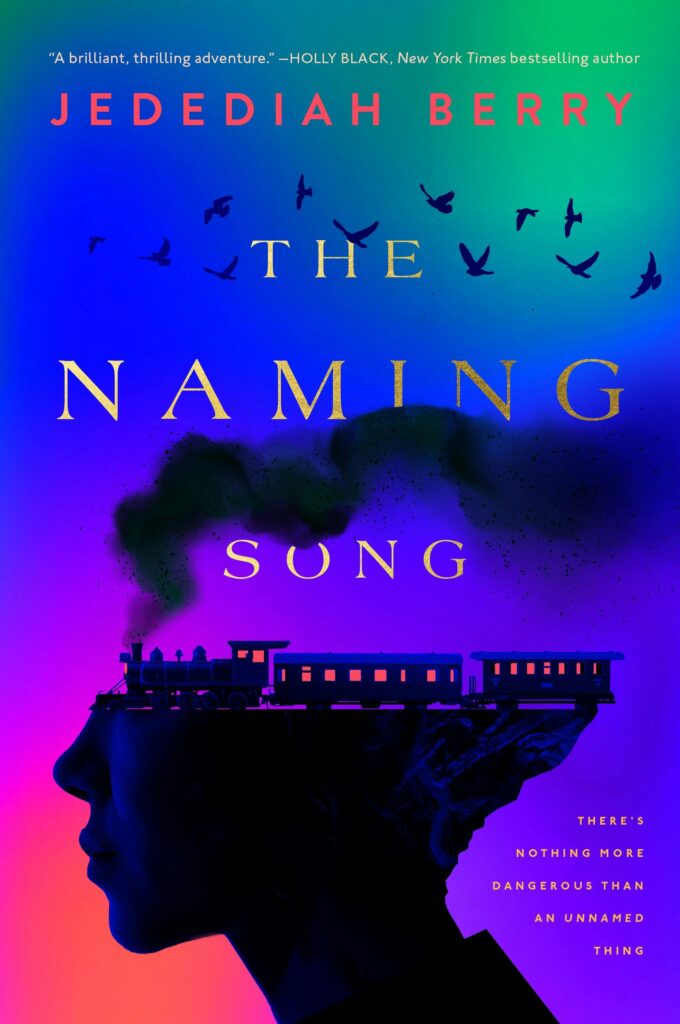Book Review: The Naming Song, by Jedediah Berry

The Naming Song by Jedediah Berry is an intriguing, engaging journey of enigmas, as much of this world has been an enigma to its inhabitants. Some kind of cataclysmic trauma has struck the world with collective amnesia, or transformed it beyond recognition, so that the words for all things have been lost. Now, diviners of the Names committee dream up words for people, objects, activities, and other concepts, and couriers deliver these Names; in so doing, they define and solidify the Named. The Named find it difficult to clearly perceive the nameless and their ways. So the only courier who is nameless, who is the protagonist of this book, is unique, merely tolerated for her utility under the protection of Book, the chair of the names committee. She rides the Number 12 train and delivers words to people in towns along the route. “She delivered stowaway. … The watchers were happy to have a word for those people. Easier to catch them that way.” There are also Sayers who say the laws that the Named must follow, and there is a Deletion Committee who decide when words are no longer appropriate, and must be unnamed; this includes Names of people, who are never seen again after that. Not all welcome this shaping of the world through defining it with names. The nameless, including people and monsters, have been attacking the Named – or is it the other way around? War is brewing. Meanwhile, the unnamed courier is lonely, missing her long-absent sister, Ticket, so she finds companionship with a patchwork ghost who draws and keeps records, with a small, furry beast who drops in on her occasionally, and with her lover, the diviner Beryl. But some time after she is attacked by a group of masked nameless people, and barely makes it back to the train, she is joined by a new companion: a monster who resembles her sister. The courier herself is put under investigation and flees. She and some of her companions join the Black Square Show, a traveling troupe of players who reenact the stories of how the world was made, and she keeps getting into trouble and finding out things. Eventually, that war that has been brewing comes to a head, and she has to choose sides. I loved this book. It’s very much its own thing, but it reminded me of some great books I’ve read (see below). The third-person prose is fairly simple and direct, even when describing the nebulous, but it expresses complex concepts well, as the courier begins to understand more and more of the world, its history, and the forces that move it. This helps make the courier very easy to empathize with in her questionings and evolution. I really enjoyed following the courier’s journey in this book, both physical and mental, through mysteries, through self-knowledge and growth, and through understanding of her world. It has interesting ideas, and it’s a really good read with a very satisfying conclusion. The Naming Song will be released Tuesday, Sept. 24, and can be preordered here. Content warnings: Violence, death, oppression, memories of childhood trauma. Also, there are some fairly horrific concepts in this book, such as calibration, what’s done to ghosts so that they become obedient servants, and even worse things that are done to ghosts and monsters. But it’s not a horror novel; it’s an adventure of travel and mysteries. Comps:Wheel of the Infinite, by Martha Wells: the traveling troupe, the puppet, and the regular redrawing and renewal of the worldA Wizard of Earthsea, by Ursula K. LeGuin: having power over someone or something by knowing its true nameNinefox Gambit, by Yoon Ha Lee: Calendrical redefinitions of reality Disclaimer: I received a free eARC of this novel from the publisher via NetGalley.
Guest Post: The Importance of Words by Jeffery Viles

Words are not just important, they are the key invention of Homo sapiens, which separates us by miles from the other animals here on planet earth. With our complex languages and hundreds of thousands of words, we describe things we can see and touch and things we only imagine. What is in front of us and what is not. The trick is to string words together in clear sentences that tell a story, an imaginative vision, or a descriptive picture. For me, the challenge is to use surprising and creative language within those sentences to catch the reader’s attention — to make the effort an entertainment for both writer and reader. Lots of species communicate non-verbally. Humpback whales sing to each other, lions roar meaningfully, gorillas thump their chests, birds trill away. But these and other animal communications are only basic modes of signaling. No other species is equipped to form words which can describe, hurt, make pictures, elate, curse, relay emotions, instruct, excite, and all the other things that words can do. “But,” you ask, “aren’t we the only species that has sex just for fun and not necessarily to procreate? Doesn’t that also distinguish us from the other animals?” Tell that to the Bonobo monkeys. “But we use tools and have an opposable thumb.” Yes, we do. And so do Chimpanzees, our nearest relative.

